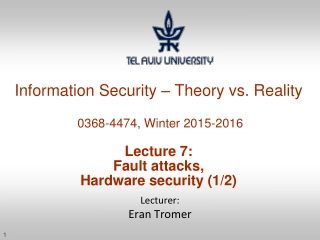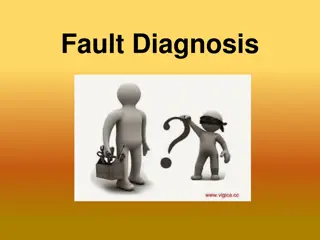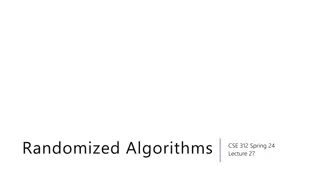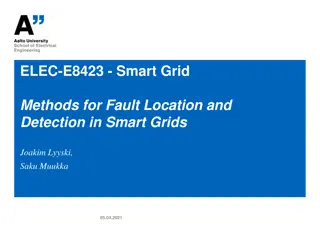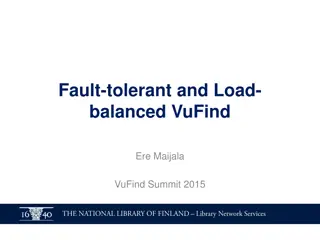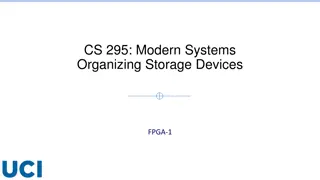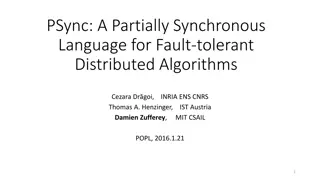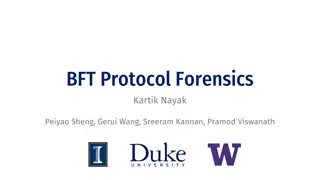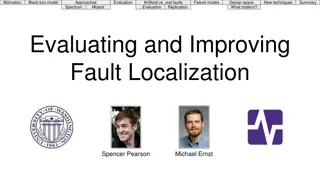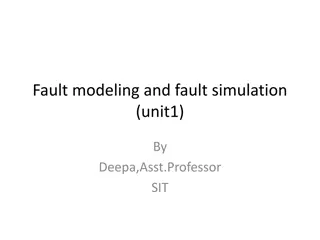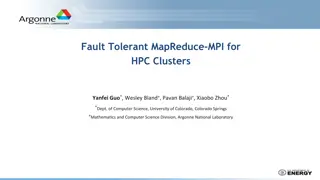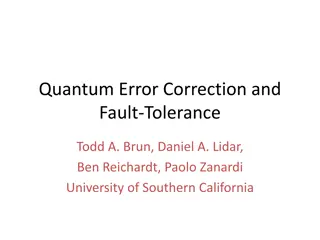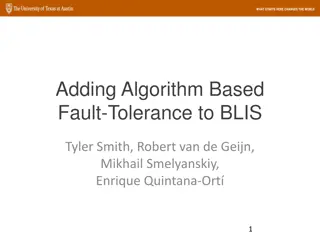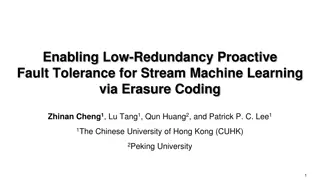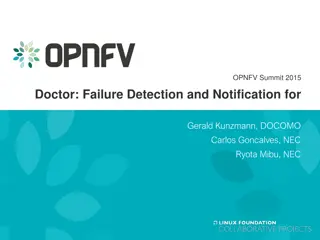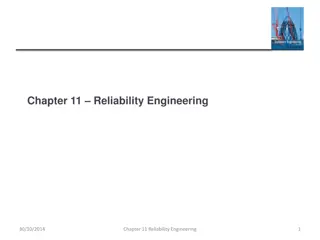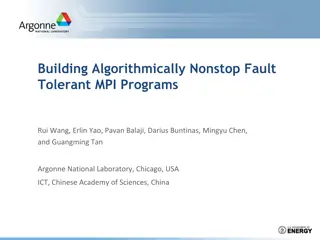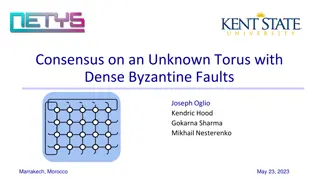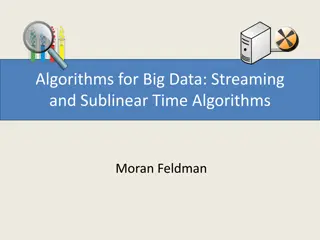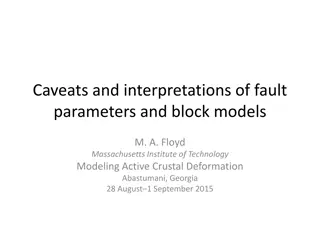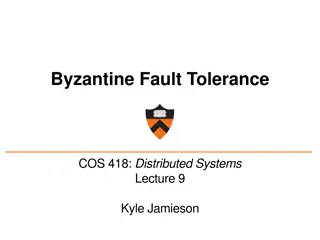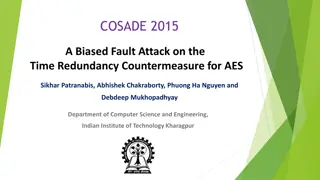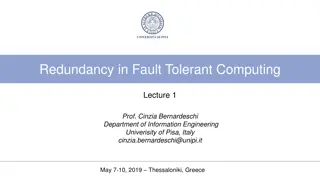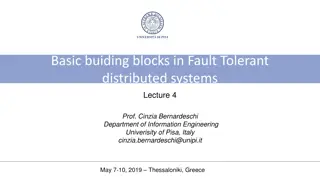Information Security – Theory vs. Reality
Exploring the concept of fault attacks in hardware security, this lecture delves into the various techniques used to compromise systems through non-nominal and nominal channels, as well as the potential risks introduced by trojan horses in the IT supply chain. The discussion includes differential fa
2 views • 37 slides
Cisco Systems Fault Managed Power Portfolio Overview
Cisco Systems offers an industry-leading Fault Managed Power (FMP) patent portfolio comprising 24 active assets across seven INPADOC families. The portfolio includes patents supporting fault-managed power systems, PoE deployments, DC power distribution, DC-DC conversion, and HVDC connectors. The FMP
7 views • 4 slides
Overview of Distributed Systems: Characteristics, Classification, Computation, Communication, and Fault Models
Characterizing Distributed Systems: Multiple autonomous computers with CPUs, memory, storage, and I/O paths, interconnected geographically, shared state, global invariants. Classifying Distributed Systems: Based on synchrony, communication medium, fault models like crash and Byzantine failures. Comp
12 views • 126 slides
Power System Fault Calculation and Protection Analysis
In this technical document, we delve into the calculation of fault current and fault apparent power in symmetrical three-phase short circuit scenarios within power systems. Through detailed equivalent circuit diagrams, reactance calculations, and per unit value derivations, the fault current and app
7 views • 15 slides
Fault Diagnosis in Mechanical and Electrical Systems
Explore the essential methods and techniques for fault diagnosis in mechanical and electrical systems in industrial settings. Learn to identify different types of faults, utilize fault-finding aids, and rectify issues promptly to prevent future failures. Discover industry-recognized fault diagnosing
2 views • 27 slides
Customer Controlled SFI (CCSFI) Fault Raising Guide
This guide by British Telecommunications plc provides detailed instructions on raising a Customer Controlled Special Faults Investigation (CCSFI) fault. It covers topics such as Version Control, Best Practices for Knowledge Based Diagnostics (KBD) and CCSFI, logging in, and step-by-step guidance for
0 views • 19 slides
Combining Graph Algorithms with Data Structures and Algorithms in CSE 373 by Kasey Champion
In this lecture, Kasey Champion covers a wide range of topics including graph algorithms, data structures, coding projects, and important midterm topics for CSE 373. The lecture emphasizes understanding ADTs, data structures, asymptotic analysis, sorting algorithms, memory management, P vs. NP, heap
3 views • 38 slides
Guide to Raising a Fault with British Telecommunications plc
This guide by British Telecommunications plc provides detailed instructions on raising a fault, including best practices, version control, and using Knowledge Based Diagnostics (KBD) for diagnosing 21C copper and fibre broadband issues. It covers logging in, running KBD, accessing fault reporting to
1 views • 15 slides
Randomized Algorithms: A Deep Dive into Las Vegas and Monte Carlo Algorithms
Randomized algorithms incorporate randomness into computations, with Las Vegas algorithms always providing the correct answer but varying in time, while Monte Carlo algorithms occasionally give wrong answers. Quick Sort is a classic Las Vegas algorithm that involves pivoting elements for sorting. Ch
4 views • 21 slides
Mathematical Analysis of Algorithms in CMPE371 - Fall 2023-2024
Explore the mathematical analysis of algorithms in CMPE371 for Fall 2023-2024, focusing on non-recursive and recursive algorithms. Learn how to analyze non-recursive algorithms by deciding on input size parameters, identifying basic operations, and simplifying summations. Dive into recursive algorit
2 views • 31 slides
Fault Location and Detection in Smart Grids
Fast and accurate fault detection and location are crucial in power grid management, especially in smart grids with bidirectional power flow. This study explores various fault location methods including impedance-based and travelling waves-based approaches. It also discusses the use of Intelligent E
0 views • 10 slides
Fault-tolerant and Load-balanced VuFind Project Overview
Project Background: Part of the National Digital Library initiative, the VuFind project aims to provide a discovery interface for Finnish archives, libraries, and museums. It started development in 2012 due to the insufficiency of existing commercial products. The focus is on enhancing fault toleran
2 views • 19 slides
Fault Localization (Pinpoint) Project Proposal Overview
The Fault Localization (Pinpoint) project proposal aims to pinpoint the exact source of failures within a cloud NFV networking environment by utilizing a set of algorithms and APIs. The proposal includes an overview of the fault localization process, an example scenario highlighting the need for fau
0 views • 12 slides
RAID 5 Technology: Fault Tolerance and Degraded Mode
RAID 5 is a popular technology for managing multiple storage devices within a single array, providing fault tolerance through data striping and parity blocks. This article discusses the principles of fault tolerance in RAID 5, the calculation of parity blocks, handling degraded mode in case of disk
1 views • 12 slides
PSync: A Partially Synchronous Language for Fault-tolerant Distributed Algorithms
PSync is a language designed by Cezara Drăgoi, Thomas A. Henzinger, and Damien Zufferey to simplify the implementation and reasoning of fault-tolerant distributed algorithms. It introduces a DSL with key elements like communication-closed rounds, an adversary environment model, and efficient runtim
0 views • 22 slides
Exploring the Role of Algorithms in Game Design
Delve into the world of algorithms in game design, from understanding the fundamental concept of algorithms to their pervasive presence in various aspects of gaming, such as military simulations, medical simulations, and gameplay mechanics. Explore how algorithms shape experiences in different types
0 views • 10 slides
Byzantine Fault Tolerance: Protocols, Forensics, and Research
Explore the realm of Byzantine fault tolerance through protocols like State Machine Replication and HotStuff, discussing safety, liveness, forensic support, and the impact of Byzantine faults. Dive into decades of research on achieving fault tolerance and examining forensic support in the face of By
1 views • 24 slides
Upcoming Changes to IPEX Fault Reporting Journey
This pack explains the upcoming changes to the IPEX fault reporting journey for customers. A new BT Wholesale Voice Products Ordering and Support System will be introduced in March 2017. Customers will need to transition to the new online IPEX fault reporting journey via the BTWholesale.com web port
0 views • 6 slides
Fault Localization Techniques in Software Debugging
Various fault localization techniques in software debugging are discussed, including black-box models, spectrum evaluation, comparison of artificial and real faults, failure modes, and design considerations. The importance of effective fault localization and improving fault localization tools is hig
1 views • 24 slides
Comprehensive Overview of Fault Modeling and Fault Simulation in VLSI
Explore the intricacies of fault modeling and fault simulation in VLSI design, covering topics such as testing philosophy, role of testing in VLSI, technology trends affecting testing, fault types, fault equivalence, dominance, collapsing, and simulation methods. Understand the importance of testing
0 views • 59 slides
Fault-Tolerant MapReduce-MPI for HPC Clusters: Enhancing Fault Tolerance in High-Performance Computing
This research discusses the design and implementation of FT-MRMPI for HPC clusters, focusing on fault tolerance and reliability in MapReduce applications. It addresses challenges, presents the fault tolerance model, and highlights the differences in fault tolerance between MapReduce and MPI. The stu
2 views • 25 slides
Quantum Error Correction and Fault Tolerance Overview
Quantum error correction and fault tolerance are essential for realizing quantum computers due to the challenge of decoherence. Various approaches, including concatenated quantum error correcting codes and topological codes like the surface code, are being studied for fault-tolerant quantum computin
0 views • 19 slides
Enhancing Fault Tolerance in BLIS with Algorithm-Based Techniques
Addressing the challenge of soft errors in supercomputers, this paper introduces algorithm-based fault tolerance methods to enhance the resilience of systems like BLIS. By integrating Application-Based Fault Tolerance (ABFT) into BLIS, the study aims to improve error detection and correction mechani
0 views • 48 slides
Low-Redundancy Proactive Fault Tolerance for Stream Machine Learning
This study focuses on enabling fault tolerance for stream machine learning through erasure coding. Fault tolerance is crucial in distributed environments due to worker failures, and existing approaches like reactive fault tolerance and proactive replication have drawbacks. The use of erasure coding
0 views • 20 slides
Doctor: Failure Detection and Notification for NFV
This presentation discusses the development of a fault management and maintenance framework for NFV, focusing on failure detection and notification. Key requirements include VIM consistency, resource awareness, immediate notifications, extensible monitoring, and fault correlation. The Doctor demo sh
0 views • 13 slides
Chapter 11 - Software Reliability and Fault Management
In software reliability engineering, understanding faults, errors, and failures is crucial. Explore fault management techniques including fault avoidance, detection, and tolerance to ensure dependable software. Discover how reliability requirements vary for different applications, from non-critical
0 views • 81 slides
Building Algorithmically Nonstop Fault Tolerant MPI Programs
Fault tolerance in large-scale supercomputers is a critical issue due to system failures. This article discusses hardware and software resilience techniques as well as Algorithm-based Fault Tolerance (ABFT) for building fault-tolerant MPI programs.
0 views • 26 slides
Consensus and Fault Tolerance on an Unknown Torus with Dense Byzantine Faults
This content discusses achieving consensus and fault tolerance on an unknown torus with dense Byzantine faults, exploring scenarios of sparse and dense faults in a network setting. It delves into the challenges of consensus algorithms on toroidal networks, highlighting the limits and complexities th
0 views • 23 slides
Algorithms for Big Data: Streaming and Sublinear Time Algorithms
Motivation behind big data research, exploration of sublinear time algorithms, and analysis of algorithms for diameter approximation and property testing. The talk delves into theoretical algorithms for big data problems, focusing on streaming and sublinear time algorithms, showcasing classical exam
0 views • 30 slides
Memory Testing Methodology Overview
Memory testing methodologies for embedded memory involve fault characteristics like Address Decoder Fault, Stuck-At Fault, Transition Fault, and Coupling Fault. Traditional solutions include Walking Pattern-Complexity, Sliding Pattern-Complexity, and Butterfly Pattern-Complexity. Embedded memories h
1 views • 11 slides
An Overview of Byzantine Fault Tolerant Consensus
In this overview, delve into the fundamental problem of consensus in distributed computing, exploring safety and liveness aspects. Discover the various facets of consensus, key research findings, and well-known results in fault tolerance. Uncover insights into Sync HotStuff protocol and its practica
0 views • 27 slides
Interpreting Fault Parameters and Block Models in Crustal Deformation
Rooted in plate tectonics theory and continuum models, this study explores the caveats and interpretations of fault parameters and block models in active crustal deformation. Emphasizing the differences between block and continuum models, it delves into the nuances of fault slip rates, block rotatio
0 views • 19 slides
Fault Location and Detection in Smart Grids
Smart Grids integrate distributed energy resources, sensing, communication, and control technologies for intelligent operation with bidirectional power flow and self-healing capability. This article explores the importance of fault location and detection in distribution networks, different types of
0 views • 10 slides
Byzantine Fault Tolerance in Distributed Systems Lecture
Explore Byzantine fault tolerance, state machine replication, and practical algorithms like Paxos and Raft in distributed systems. Learn about handling arbitrary failures, providing high reliability, and case studies on fault-tolerant systems like Boeing 777 fly-by-wire controls.
0 views • 41 slides
Understanding Fault Tolerant Consensus for Reliable Systems
Explore the concept of fault-tolerant consensus in computer systems, covering topics such as Byzantine fault tolerance, replication strategies, consensus types, and fault tolerance bounds. Learn about key protocols like PBFT and motivations behind fault tolerance in system design.
1 views • 20 slides
Biased Fault Attack on Time Redundancy Countermeasure for AES
This study presents a biased fault attack on the time redundancy countermeasure for AES-128, developing biased fault models to undermine the countermeasure, with simulations and experiments to validate the proposed attacks. The research explores the impact of bias quantification, adversarial strateg
0 views • 25 slides
Large-Scale Graph Processing with Pregel System
Explore how Pregel, a scalable and fault-tolerant platform, revolutionizes large-scale graph processing by offering a flexible API for expressing complex algorithms and implementing a vertex-centric computation model. Overcoming challenges in graph algorithms, Pregel addresses the need for a distrib
0 views • 56 slides
Redundancy in Fault Tolerant Computing Lecture by Prof. Cinzia Bernardeschi
Explore the importance of fault-tolerant computing in safety-critical systems, covering forms of redundancy in computer-based systems, hardware and software redundancy, and the effectiveness of fault tolerance. Learn about fault-tolerant computing's role in various industries like aerospace and auto
0 views • 72 slides
Fault Tolerant Distributed Systems: Models and Solutions
Explore fault models in distributed systems, understanding communication failures, node failures, and Byzantine processes. Learn about fault tolerance algorithms and the impact of fault models on system complexity. Discover key concepts presented in a lecture by Prof. Cinzia Bernardeschi.
0 views • 65 slides
Understanding Fault Tolerance in Distributed Systems
Explore fault tolerance mechanisms in distributed systems, covering fault classification, tolerance types, core problems, consensus results, and algorithms. Learn about fault types, masking systems, agreement protocols, clock synchronization, and more to enhance system reliability and resilience.
0 views • 19 slides
